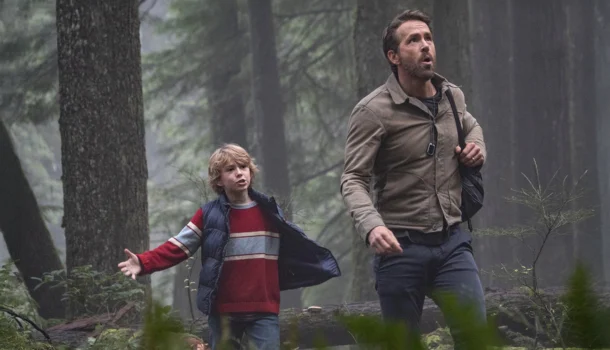Science fiction often lures us with visual grandeur and complex logic. But in directing “The Adam Project,” Shawn Levy chooses a less deafening and more introspective path. Unlike the exuberance that defined “Free Guy,” here he crafts a time-travel drama that raises more questions than it answers, exploring not the paradoxes of time but the emotional fissures of those who attempt to navigate it. His focus lies less in the genre’s usual spectacle and more in what remains when that spectacle is stripped away: unresolved memories, broken bonds, and the relentless search for reconciliation with who we once were — or perhaps still are, in a deeper layer of experience.
As he moves the narrative pieces, Levy seems less concerned with definitive answers than with sketching dilemmas that never quite fit together. Ryan Reynolds steps beyond his usual caricature, portraying Adam Reed with a rare blend of sarcasm and vulnerability. The time jump — from 2050 to 2022 — is not a trick to save the world but a desperate attempt to mend a personal past. What Levy draws, with subtlety, is an intimate paradox: a grown man returning not to rewrite history, but to confront his own emotional wreckage.
The screenplay — written by Jonathan Tropper, Mark Levin, Jennifer Flackett, and T.S. Nowlin — invests in the tension between different versions of the same person, and it’s in the confrontation between adult Adam and his 12-year-old self, played by Walker Scobell, that the film finds its most genuine heartbeat. The boy, marginalized at school and emotionally adrift, reflects not only the roots of the adult’s sarcastic persona but also an echo of hope that persists despite grief and abandonment. The mother, played by Jennifer Garner, serves as the fragile link between the two Adams, trapped in mourning and the daily effort to rebuild, unaware that both sons — literal and symbolic — still long for comfort.
This dialogue between past and present is no mere narrative device: it’s the key to a drama that only reveals itself when one admits that maturity rarely follows a straight line. In revisiting his childhood, the adult Adam is forced to confront not only his losses but also the cruelty with which he rejected the boy he once was — who, despite his pain, carried a kind of courage that time eventually eroded. Levy explores this conflict with emotional intelligence, steering clear of shallow sentimentality. The irony lacing the protagonist’s lines serves as armor, but it’s precisely when that defense starts to crack that the film reaches its most honest moments.
However, as the plot transitions into the second act, there’s a clear turn toward genre convention. References to classics like “The Terminator,” “Back to the Future,” and “Frequency” become evident, and the film adopts a more standardized aesthetic. The action sequences, though well executed, bring little innovation. The roles of Laura (Zoe Saldaña) and Louis (Mark Ruffalo) are reduced to archetypes of emotional support and scientific genius, respectively — functional, but underdeveloped.
The antagonist Maya Sorian, played by Catherine Keener, fulfills her role in the narrative structure, yet remains bound to a generic portrayal of corrupted power, adding little depth to the central conflict. Still, Levy uses these familiar elements as a frame for a larger ambition: to suggest that interfering with the past may seem alluring, but carries ethical dilemmas that undermine any illusion of perfect repair. The idea of manipulating time collides with a bitter truth — that some failures may be beyond recovery, and some longings, forever unfulfilled.
More than offering answers, “The Adam Project” provokes discomfort: if we could go back, would we be able to forgive who we once were? The central reflection isn’t about rewriting historical events, but about what it truly means to face the weight of the choices that shaped us. Adam Reed is less a hero than a mirror — distorted, yes, but revealing — of the universal desire to repair the irreparable. In this sense, the film leans more toward existential fable than conventional sci-fi escapism, inviting viewers not to return to chronological time, but to the emotional past, where perhaps some version of the self is still waiting for a chance to begin again.
Film: The Adam Project
Director: Shawn Levy
Year: 2022
Genres: Adventure/Drama/Sci-Fi
Rating: 7/10

